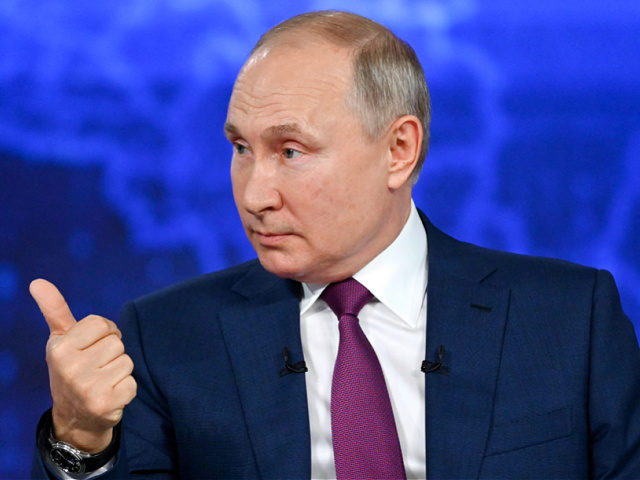Russian President Vladimir Putin claimed during a live call-in show on Wednesday that he received the Russian-made Chinese coronavirus vaccine candidate “Sputnik V,” addressing months of speculation about which brand of coronavirus vaccine the leader had received.
“In a comment on the TV presenter’s remark that Russians should get vaccinated with Sputnik V, which Putin has chosen for himself, he said: ‘No not necessary at all,'” the Russian state-run TASS News Agency reported on June 30.
TASS referred to Putin’s appearance on Direct Line, an annual live call-in show in which Putin responds to pre-screened questions from Russian citizens.
“He [Putin] claimed he hadn’t gone public previously with the type of vaccine he received because he didn’t want to give the vaccine makers a competitive advantage,” Radio Free Europe/Radio Liberty (RFE/RL) reported of Putin’s vaccine revelation on Direct Line.
The Kremlin announced in March that Putin had received a Chinese coronavirus vaccine but did not disclose exactly when he was administered the inoculation nor which brand of vaccine he had chosen.
Putin withheld the information from the public in an effort to convey that “all three Russian vaccines are absolutely reliable, very good and effective,” Kremlin Spokesman Dmitry Peskov said at the time.
Putin’s decision not to photograph or record his Chinese coronavirus inoculation surprised many observers, as several world leaders have either broadcast their Chinese coronavirus vaccinations on live television or otherwise documented them at official state-run press conferences attended by photo and video journalists.
Observers believe Putin chose to reveal that he received Sputnik V on Wednesday as part of the Kremlin’s effort to increase Chinese coronavirus vaccinations among the Russian public, particularly within the national capital, Moscow, which has recorded a sharp increase in new cases of the disease in recent weeks.
Peskov told reporters on June 18 that “overwhelming nihilism, a low vaccination rate, and the deviousness of the infection itself” were the causes of Moscow’s latest coronavirus surge.
“Russia’s vaccination campaign had clearly not been as effective as desired,” the Kremlin spokesman admitted during a regular press briefing in Moscow.
Russia became the first country in the world to approve a Chinese coronavirus vaccine candidate for emergency use in August 2020 when Putin unveiled “Sputnik V,” a two-dose viral vector vaccine candidate. At the time, the product had yet to complete Phase III clinical trials.
Viral vector vaccines utilize a “modified version of a different virus (the vector) to deliver important instructions to our cells” on how to fight the targeted virus, according to the U.S. Centers for Disease Control and Prevention (CDC).
“The virus, which is used as a vector, is altered so it poses no threat of causing an illness. It is also inserted with an extra gene that is unique to the virus being targeted,” RFE/RL explained in a March report on Sputnik V. “For COVID-19 [Chinese coronavirus] vaccines, this gene contains instructions on how to make a spike protein, which is found on the surface of the coronavirus.”
“Once a person gets the vaccine, the vector enters a cell and uses it to make spike proteins. As soon as the immune system recognizes the spike proteins, it starts producing antibodies and activates other immune processes in the body. If the system interacts with the actual virus in the future, it already knows how to fight it,” according to the U.S. government-funded broadcaster.
The Russian health ministry’s Gamaleya Research Institute of Epidemiology and Microbiology developed Sputnik V last year. Russia’s federal government approved Sputnik V for emergency use in the country in August 2020 before it had completed late-stage clinical trials.
Sputnik V demonstrated an efficacy rate of 92 percent against the Chinese coronavirus in late-stage clinical trials published by the Lancet medical journal in February. A cohort of international scientists published an open letter to the Lancet in May, however, expressing doubts about the clinical research used to produce the February study of Sputnik V.
“Four Russian vaccines against COVID-19 [Chinese coronavirus] have been registered in the country now,” TASS claimed on June 30.
“Among them are Sputnik V and Sputnik Light developed by the Gamaleya Research Institute of Epidemiology and Microbiology of the Russian Health Ministry, EpiVacCorona by the Vector Center of the Federal Service for Surveillance on Consumer Rights Protection and Human Wellbeing, and CoviVac of the Chumakov Center of the Russian Academy of Sciences,” according to the Russian state-run press agency.
“Sputnik V, EpiVacCorona and CoviVac are two-dose vaccines, and Sputnik Light is a single-dose vaccine,” TASS noted.

COMMENTS
Please let us know if you're having issues with commenting.